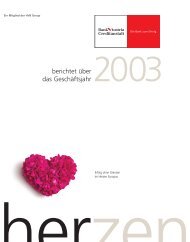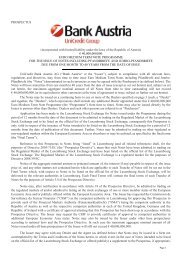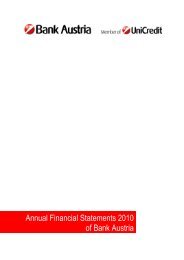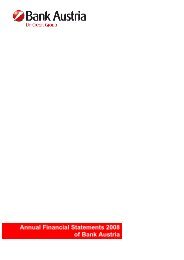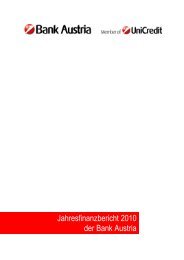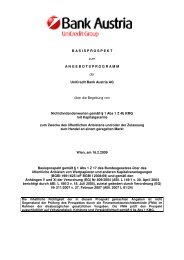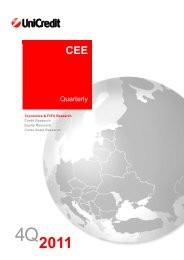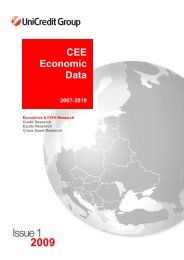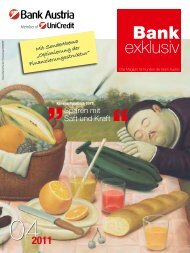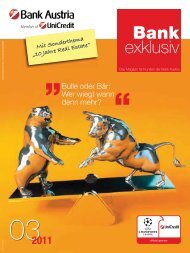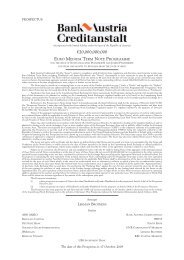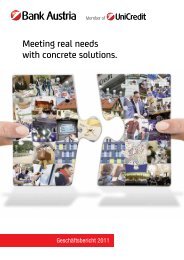Annual Financial Statements 2011 of Bank Austria
Annual Financial Statements 2011 of Bank Austria
Annual Financial Statements 2011 of Bank Austria
You also want an ePaper? Increase the reach of your titles
YUMPU automatically turns print PDFs into web optimized ePapers that Google loves.
Management Report <strong>of</strong> UniCredit <strong>Bank</strong> <strong>Austria</strong> AG<br />
A personnel-intensive service company seeking to increase<br />
efficiency needs to make investments in the buildings it uses. With<br />
the realisation <strong>of</strong> the <strong>Bank</strong> <strong>Austria</strong> Campus project, the head <strong>of</strong>fice<br />
functions currently performed in various locations will be<br />
concentrated within a single headquarters complex. <strong>Bank</strong> <strong>Austria</strong><br />
will develop, build and utilise a new business location with<br />
workplaces for about 4,000 employees <strong>of</strong> the bank by 2016.<br />
Planning permission will probably be granted by the authorities in<br />
2012. Since <strong>2011</strong>, UniCredit <strong>Bank</strong> <strong>Austria</strong> AG has been building an<br />
innovative basic and ongoing training centre at Kaiserwasser in<br />
Vienna. The training centre – with Turin, UniCredit Group’s second<br />
international centre for management development – will include<br />
sports and leisure facilities, and facilities for events. After<br />
completion, scheduled for the end <strong>of</strong> 2012, it is envisaged that<br />
about 4,000 employees from all the regions covered by the Group’s<br />
operations will participate in training courses at the centre each<br />
year.<br />
3. Events after the balance sheet date<br />
The guarantee assumed in April 2010 for a second loss position <strong>of</strong><br />
a synthetic securitisation issued by the Ukrainian banking<br />
subsidiary ("Ukrsotsbank") expired and was renewed by UniCredit<br />
<strong>Bank</strong> <strong>Austria</strong> AG at the end <strong>of</strong> December <strong>2011</strong>. The Ukrainian<br />
central bank gave its approval as at 31 January 2012. At the end <strong>of</strong><br />
<strong>2011</strong> the transaction amounted to USD 1,125.3 m (guarantee<br />
amount).<br />
4. Report on key features <strong>of</strong> the internal control and risk<br />
management systems in relation to the financial reporting<br />
process<br />
The Management Board is responsible for establishing and<br />
designing internal control and risk management systems which<br />
meet the company’s requirements in relation to the financial<br />
reporting process. The purpose <strong>of</strong> this report is to provide an<br />
overview <strong>of</strong> how internal controls are organised in relation to the<br />
financial reporting process.<br />
The objective <strong>of</strong> the internal control system is to assist<br />
management in assuring internal controls in relation to financial<br />
reporting which are effective and are improved on an ongoing<br />
basis. The system is geared to complying with rules and<br />
regulations and creating conditions which are conducive to<br />
performing specific controls in key accounting processes.<br />
Following the integration <strong>of</strong> the <strong>Bank</strong> <strong>Austria</strong> Group in UniCredit<br />
Group, the Italian Savings Law, Section 262 (process description<br />
for minimising risk in preparing financial statements) in particular,<br />
must be complied with in addition to the existing internal control<br />
system.<br />
Pursuant to the “262 Savings Law”, the CEO and the CFO<br />
delegated by UniCredit S.p.A. are liable, under civil and criminal<br />
law, for any violation <strong>of</strong> the legal provisions. They are also<br />
responsible for every subsidiary within the group <strong>of</strong> consolidated<br />
companies which is covered by financial reporting because the<br />
“262 Savings Law” deals with consolidated financial statements.<br />
Internal Audit performs independent and regular reviews <strong>of</strong><br />
compliance with internal rules also in the area <strong>of</strong> accounting. The<br />
Head <strong>of</strong> Internal Audit reports directly to the Management Board<br />
and provides the Chairman <strong>of</strong> the Supervisory Board with quarterly<br />
reports.<br />
Control environment<br />
The basic aspect <strong>of</strong> the control environment is the corporate<br />
culture in which management and all employees operate.<br />
UniCredit S.p.A., the parent company <strong>of</strong> UniCredit <strong>Bank</strong> <strong>Austria</strong><br />
AG, works to maintain effective communication and convey the<br />
corporate values defined in the Integrity Charter. The Integrity<br />
Charter embodies the UniCredit Group’s identity and is based on<br />
the following shared values: fairness, transparency, respect,<br />
reciprocity, freedom to act, and trust.<br />
The implementation <strong>of</strong> the internal control system in relation to the<br />
financial reporting process is also set out in the internal rules and<br />
regulations:<br />
All accounting entries are made within the guidelines established in<br />
the Accounting Policy, and release follows defined instruction and<br />
control criteria. For each general ledger account there is a<br />
responsible person who reconciles the general ledger accounts in<br />
accordance with existing rules. This internal reconciliation process<br />
is interrogated by <strong>Financial</strong> Accounting and reviewed by Internal<br />
Audit.<br />
Risk assessment<br />
In the course <strong>of</strong> the “262 Savings Law” project, the persons having<br />
process responsibility identified risks in relation to the financial<br />
reporting process; these risks are monitored on an ongoing basis.<br />
The focus is on those risks which are typically considered to be<br />
material.<br />
To meet the “262 Savings Law” requirements, controls pursuant to<br />
the methodology used by UniCredit S.p.A. are required to be<br />
performed at least on a half-yearly basis (for full-year and half-year<br />
reporting).<br />
Controls<br />
All controls are applied in the current business process to ensure<br />
that potential errors or deviations in financial reporting are<br />
prevented or detected and corrected. Controls range from a<br />
management review <strong>of</strong> results for the various periods to specific<br />
reconciliation <strong>of</strong> accounts and the analysis <strong>of</strong> continuous<br />
accounting processes.<br />
The levels <strong>of</strong> hierarchy are designed so that an activity and the<br />
control <strong>of</strong> that activity is not performed by the same person (foureyes<br />
principle). In the course <strong>of</strong> the preparation <strong>of</strong> financial reports,<br />
the general ledger accounts are reconciled with business and frontend<br />
systems.<br />
IT security controls are a cornerstone <strong>of</strong> the internal control<br />
system. IT access authorisation is handled on a very restrictive<br />
basis. The operation <strong>of</strong> the financial reporting system is also<br />
assured through automated IT controls included in the system.<br />
<strong>Bank</strong> <strong>Austria</strong> – <strong>Annual</strong> <strong>Financial</strong> <strong>Statements</strong> <strong>2011</strong> 208



